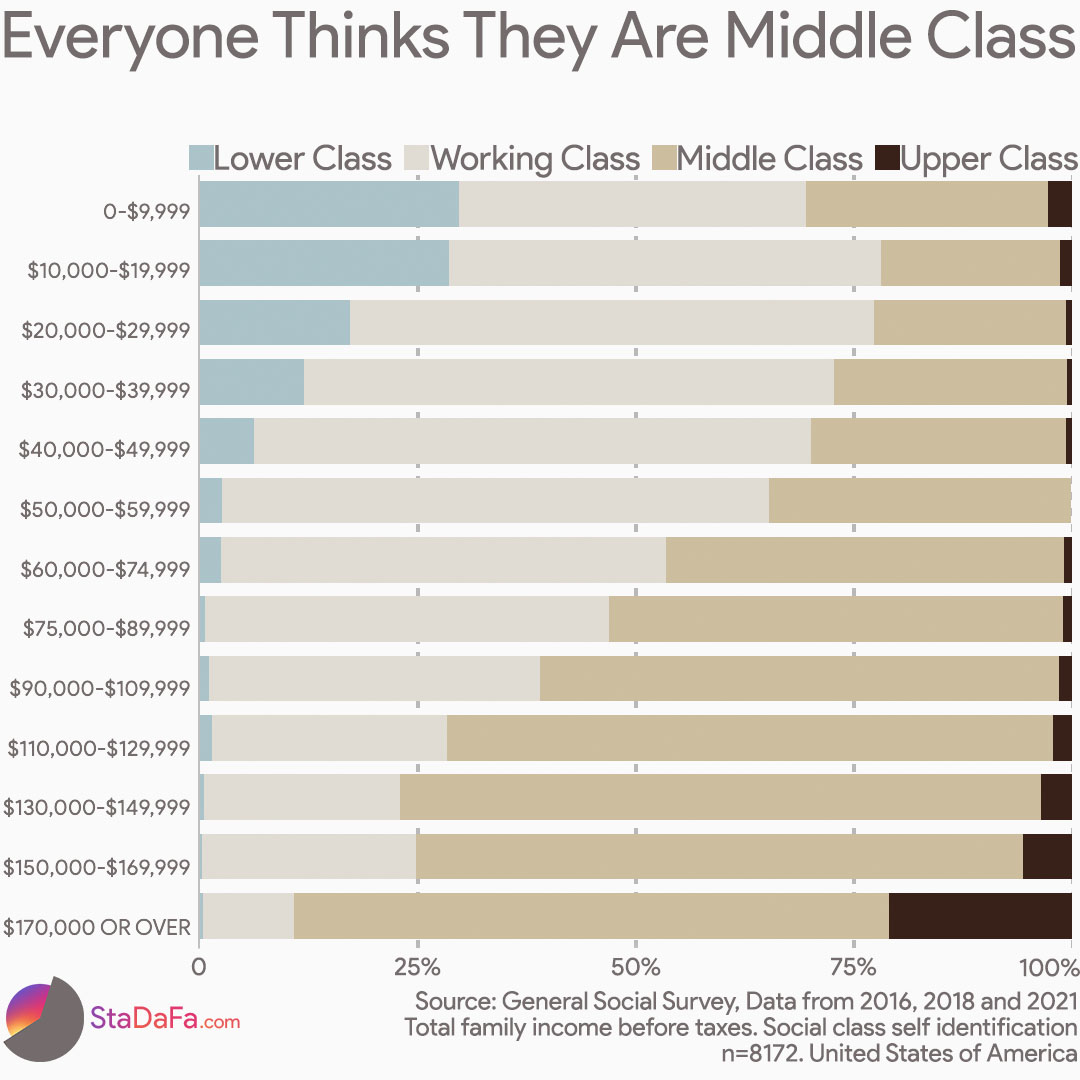https://www.businessinsider.com/what-it-takes-to-be-middle-class-middle-income-wealth-2024-5
“If we admit that we’re very class-based — which we really are — that reveals the uncomfortable truth that we’re not as democratic as we like to pretend to be, which is the heart and soul of this country,” he said. “If we’re not truly democracy, then what are we? That’s the whole justification for creating this country.”
Middle-income earners aren’t acting like they’re middle-class.


Income level has never been the material basis of class. Class is determined by your relation to production. We’ve known this for a long time.
If we’re not truly democracy, then what are we?
Three dictatorships of the bourgeoisie in a coat.
While many might think middle-income Americans would be living this dream, they’re not.
Who are the “many” in this sentence?
the esteemed readers of the New York Times

middle class earners spend like lower-income workers
i love that they won’t even refer to middle class people as workers - they’re “earners” as if theyre bourgeoisie lmao. we can’t let the various proles start getting the idea that they’re all on the same team!

The “middle class” historically are bourgeois. They’re the “middle” class between the peasantry and the nobility. Since the bourgeoisie supplanted the nobility as the global ruling class, “middle class” has mostly just turned into vague self-identifier of relative income among liberals. American minimum wage workers and millionaires both broadly believe they’re “middle class” while everyone with less accumulated wealth is the deserving poor and anyone with more is the decadent cosmopolitan elite. Neither will consider what that implies about the relative wealth and income of most Americans compared to the majority of the world, because of course, only imperial citizens are “middle class” (free, democratic, good, etc.) and everyone else in the world must either be primitive savages who choose to live in squalor, or brainwashed subhuman bug-people whose collectivist totalitarianism is threatening America’s ability to produce this “middle class” lifestyle for an increasingly small minority of humanity.
Isn’t middle class basically a meaningless term anyways? There’s only 2 classes.
Edit: bit idea where Marxists do the lame 2 genders joke but with class instead
Citations Needed has a great episode about the phrase “middle-class”. “It’s a capitalist carrot hovering over our heads telling us such things are possible if we Only Work Harder. More than anything, it’s a way for politicians to gesture towards populism without the messiness of mentioning––much less centering––the poor and poverty.” https://citationsneeded.libsyn.com/episode-91-its-time-to-retire-the-term-middle-class
I know I listened to that one but I need to revisit. It always bothered me anyways because it seemed like a way to (falsely) elevate yourself above ‘lower class’
Yeah everyone thinks they’re “middle class” because in the US the poor are trained to think aspirationally and the rich are trained to downplay the exploitative source of their wealth.

I remember feeling pressure when I was a kid to say I was middle class when we had some sort of assembly where a guy came in and taught us the difference between ‘needs’ and ‘wants’.
Somewhere in there kids were telling what class they were and I felt the need to say my family was middle class when we were nowhere near that, but I remember my dad saying we were ‘middle class’ at one point or another during my childhood, so I didn’t know any better.
My mom used to wake my 3 sisters and I up at 4 in the morning to go pile into the backseat of the frozen ass car to drive my dad to work. This was so she had the car to then take us to school at 7:30, and she could run errands if necessary later on. I would get made fun of at school for my shoes being so small that my big toe stuck out the front and for my coat not zipping up properly because it was too small. This in brutally cold midwestern winters.
We ate casseroles or hotdogs or soup for dinner most nights and we weren’t rich enough to bring “snacks” to school for “snack time” so I was always one of a couple of kids that had a family that couldn’t afford to send snacks to school, while other kids were eating their gushers and fruit roll-ups and whatever else right in my face.
But you know… I’d be damned if I was going admit to anyone that we were poor as fuck.
I like how the upper class response is larger for people making less than $10,000/yr than any other bracket until you hit $150,000
It honestly depends on how you want to define it and under what framework. In Marxism the definition of class depends on the relationship to the means of production. Obviously using the Marxist framework is the most accurate to describe what’s actually happening and as Marxists we should use those definitions and try to inform people as best we can that proletariat and bourgeoisie are the two main and oppositional classes (primary contradiction) in capitalism. But like Mardoniush pointed out there still are other classes since the relationship to the means of production can be more complicated than just straight ownership vs labor despite the antagonism of those two classes being the primary contradiction.
Still, none of those are a “middle class” and you are completely right about how one of the big reasons that term gets heavily used is so the parts of the proletariat that are not impoverished can feel elevated above those who are. But that right there means there is a material difference between certain subsets of the proletariat that gets called “middle class” and “lower class.” There is a large subset that historically in the US was generally well off (comparatively) to the subset that lives in poverty conditions, and it is true that the former subset is shrinking while the latter subset is growing (along with the intensity of the contradictions). It is not wrong to point this out, and “middle class” is definitely not meaningless when used this way, it’s just that using the word “class” to describe this phenomenon is deliberately muddying the waters and it’s not using the term according to a Marxist framework. Don’t mistake that to mean that what the OP article is saying is untrue or isn’t happening, because it most definitely is happening! It’s just bad semantics.
There are more classes (there are still a few owner-operated farms, which technically count as Yeomanry, and the PB is a different class to the HB), Proles and Bougies are just the main ones.
If we’re not truly democracy, then what are we? That’s the whole justification for creating this country."
Brother the country was created because people didn’t wanna pay taxes
I think the overwhelming reason was less an issue of taxes, and more an issue of Britain pressuring the ending of slavery which was the entire basis of the colonies economy. Britain levying taxes unilaterally was unpopular for 2 major reasons, they did not get any input from the colonies, and the money was being raised to pay debts related to the 7 years war, something the colonists felt they had no responsibility to pay.
The taxation was something easily sold to everybody, but the true concern of the ruling class was Slavery.
The 1772 Somerset Case ruling is a good place to start if anyone would like to read more about this.
Edit: to clarify, it’s not as black and white as I make it seem. But slavery was the major function uniting the south in the north’s bid for independence.
Wasn’t there also something about the settlers being pissed about the British government restricting how for west the settlers could go to steal native labs and get their Lebensraum?
At the time Britain didn’t have as much of a military and had a lot of debt due to overstretching their empire essentially, so there were a lot of fears that the American colonies could get away from Britain both economically and authoritatively. One way they thought to reign in this rogue colony was by instituting a sugar and molasses tax, which would siphon money to pay off war debts. This was extra insulting because the American colonist didn’t see themselves as British, this was seen as paying off another countries debt. They saw themselves as American, a vital component of any settler colonial state. Netanyahu doesn’t present himself as a resident of New Jersey. He is an Israeli citizen.
Another way they looked to contain the American colonies was to limit westward expansion, correct. Unchecked expansion would very quickly let the colony get out of control.
While England profited extremely well from the Atlantic slave trade, namely, by turning that cheap cotton into textiles, they also started turning an eye towards ending slavery, both at home and abroad in colonies, including the Americas. This becomes an important factor and a major concern for both the the slaveholding colonists and the slaves themselves seeking freedom.
It’s no great big coincidence that the constitution laid out a future date ending the importation of slaves. Northern parties wanted to end slavery immediately, or at least lay out the foundation in the path forward for ending slavery. The slave holding parties involved were OK with this middle ground because they foresaw that they wouldn’t need to import any more slaves if they would turn their attention towards breeding programs.
Britain tried a lot to kind of smother the colonies in the cradle. Shame they didn’t do more.
I feel it’s also important to note that the majority reason the north wanted to end slavery was not out of humanitarian reasons, although that was a factor. It was an economic conflict between the northern and southern economies essentially. The north couldn’t really compete with the south when the north has to pay wages and the south doesn’t. This point of time is very deep and very wide. Lots to read and lots to study.
Your edit is reasonable but to suggest it as the overwhelming cause seems a bit too far. Granted I’m not a historian but I’ve heard it suggested there isn’t enough to support that view
That’s most likely correct, my wording should have been better. I just chafe when I see the america settler colonial projects bid for independence framed only as an issue of taxation. With more reading of diverse sources Slavery focuses into one of the major motivators.
Further context can be found in the way the slavery conflict was written into the declaration of independence. Even with independence from Britain won, the uniting of the northern industrial and southern slave economies was on extremely rocky footing. By examining the Civil War you can trace the roots of major issues to the American War of Independence.
It’s fascinating to me so I’ll add it to my list of things to look into. Thanks for including it in your comments.
Slaves were just as instrumental in the war of independence as they were in the Civil War. During both conflicts they were misled by false promises of freedom. It’s a very fascinating part of American history that has been largely overlooked by white male historians, go figure.
I ended up finding this article about the fate of African Americans after the Yorktown Treaty. Interesting stuff.
Most historians who cover Yorktown are content to celebrate Washington’s military genius. The blinders imposed by the lingering effects of American exceptionalism deter them from grappling with issues that would complicate the traditional triumphalist narrative. A clear-eyed look at the sources—including those recorded by British and German participants—reveals that for the 200,000 African Americans who composed 40 percent of the Old Dominion’s population, freedom wore a red coat, not blue, in 1781.
In the leadup to the War of Independence, prominent white colonists feared that British authorities would liberate their enslaved persons in retaliation for rebellion. The African American population certainly hoped that would be the case. After conversing with two Blacks in service to a Pennsylvania family fleeing the Redcoats’ advance on Philadelphia, Rev. Henry Melchior Muhlenberg, a Lutheran minister, confided to his diary on September 20, 1777: “They secretly wished that the British army might win, for then all Negro slaves will gain their freedom. It is said that this sentiment is almost universal among the Negroes in America.”
The book Settlers is always highly recommended and it delves into this event a little, a good companion piece could be The 1619 Project as well!
Name more iconic duo than Americans and seceding to keep slavery. It happened thrice.
Yeah, but you don’t need a democracy just because you had a revolution over taxes. It was a democracy by and for the bourgeoisie out of necessity, meant to handle internal class conflict for a class that was far from nonhierarchical, but also much more distributed than the strict pyramid structure of the monarchy. The settlers importing and enslaving a bespoke proletariat resulted in a class fluidity that made it necessary to establish governance that would accommodate that fluidity. Specifically, of the ruling class being based on capital ownership as well as race and sex.
Really well said.
Thank you. It’s mostly paraphrasing Settlers, but I think the bit about the democracy being by and for the bourgeoisie makes a lot of American mythology makes sense. At least for me, it connects the dots because the ideals Americans are taught about democracy and the source of those ideals in the self-interest of land-owning male slave owners. These were very practical considerations for material problems.
Same. I like to rationalize it as them thinking about their (class) problems in very selfish and largely un-critical ways, then conversing with other like minded individuals who share selfish (class) interests, then they write those ideas down and that becomes what is taught to all. Since they hold an overwhelming monopoly on power those ideas remain largely unchallenged as they go on to shape history. They make sense from their point of view to me, because it’s exactly their point of view, without any consideration for the possibility of my point of view. It’s the various interpretations and justifications after the fact that filter their way through the generations. It really makes the idea that we have an unchanging constitution extra terrifying.
It’s our point of view and our expectations that their words mean “liberty and freedom for all,” but their point of view meant exactly what was on the tin “liberty and freedom for all (of my class)”
finally, some honest fucking liberals
it’s like they’re close enough to taste it but not strong enough to follow through.
You’ll see more of that as the crises of capitalism intensify and become more frequent. You’ll see more reformist takes as they scramble to address the unaddressable pitfalls of late capitalism in order to prevent revolutionary responses from naturally emerging.
we
 in a society
in a society“BUY MORE FUNKO POPS AND USELESS SHIT FOR YOUR KITCHEN YOU USE ONCE THEN PUT AWAY IN THE BACK OF THE CUPBOARD FOREVER YOU DISGUSTING PLEBEIANS! I NEED ANOTHER STORY ON MY YACHT!”
Therr is no “middle class” any more. The only house s built are either
 starting at $350k with HOAs or group homes with no semblance of privacy…
starting at $350k with HOAs or group homes with no semblance of privacy…

















